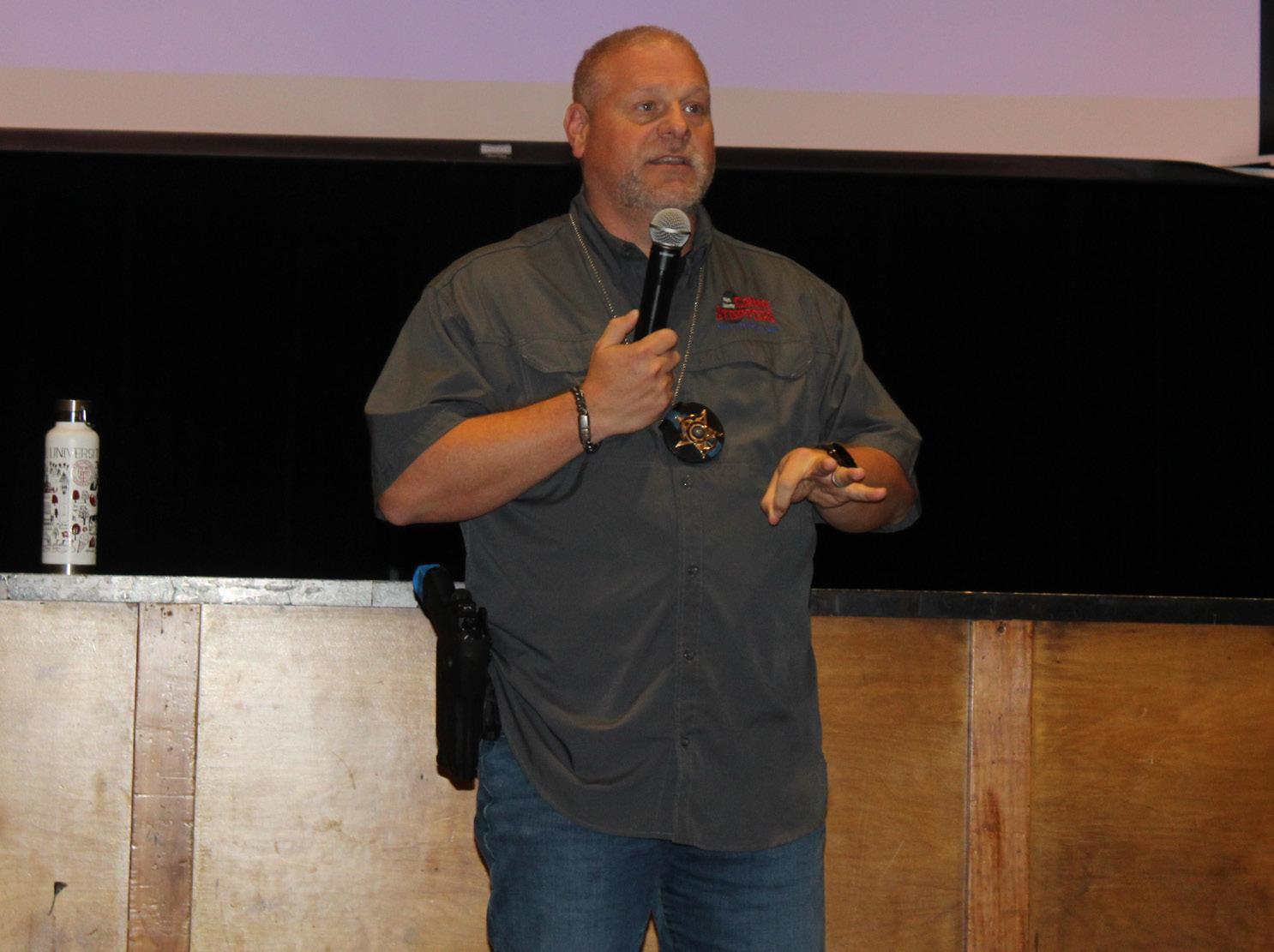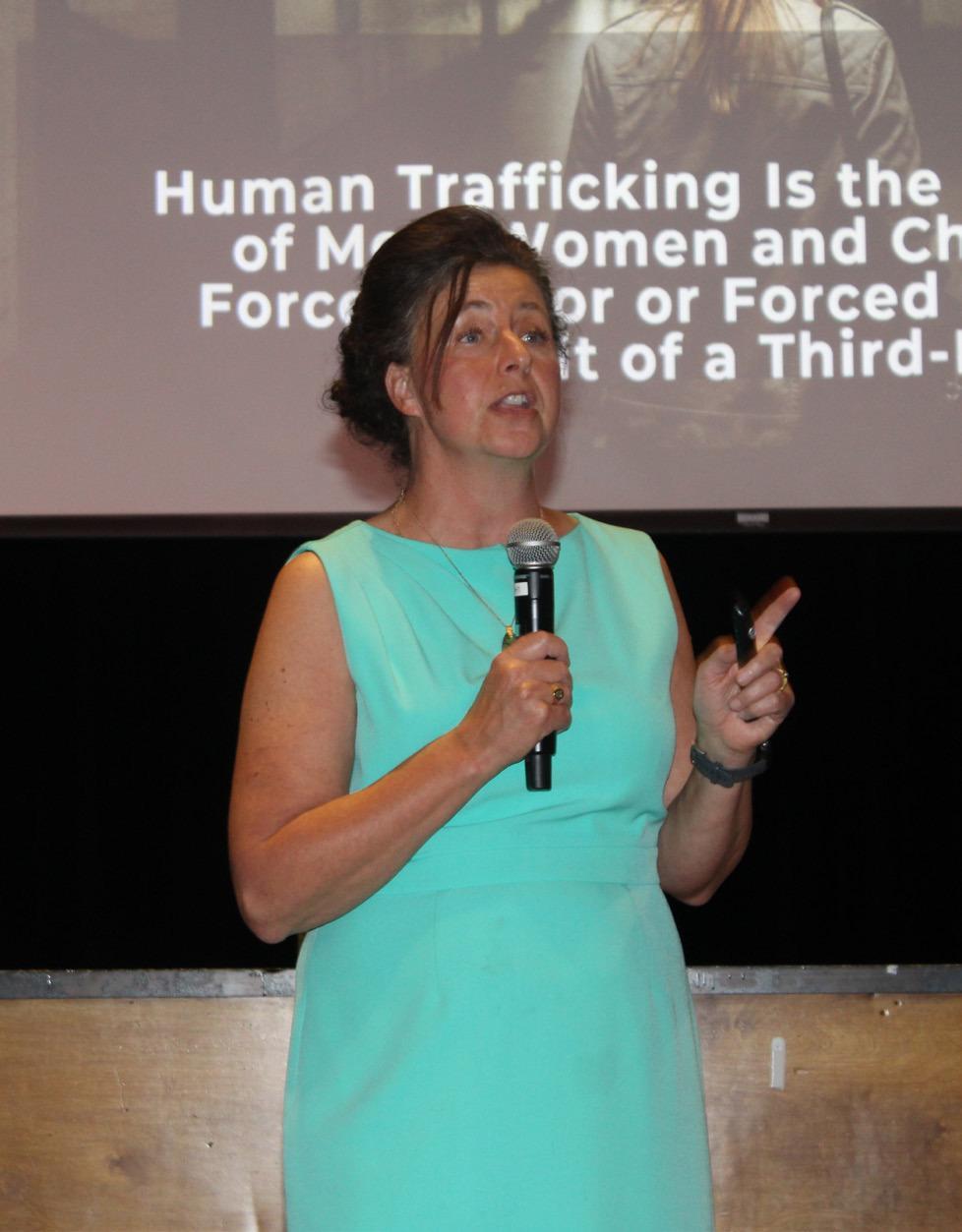
Hays County Crime Stoppers Executive Director Jeff Jordan spoke at the Town Hall.
Daily Record photo by Shannon West

Kirsta Melton, a prosecutor who has tried human trafficking cases for a decade, told some stories of cases she has tried and gave red flags to look for.
Daily Record photo by Shannon West
Child and human trafficking town hall educates public
Content Warning: This article contains true stories of child sexual assault and child trafficking.
Whether it is obvious or not, human and child trafficking happens. It also has a wide sweeping definition. It even occurs here in Hays County, according to expert Kirsta Melton, who has been prosecuting human traffickers for the past decade. A Child/Human Trafficking Town Hall was held on April 18 at Goodnight Middle School to educate the public in an effort to decrease occurrences of this crime. It was sponsored by the Youth Service Bureau, the Greater San Marcos Youth Council, Hays County Women’s Center, the Rotary Club, Kiwanis, the Lions Club, Rotaract, VFW, Young Life and CASA of Central Texas.
According to the US Department of Justice website, human trafficking is a crime that involves compelling or coercing a person to provide labor or services or to engage in commercial sex acts. The coercion can be subtle or overt, physical or psychological.
“That’s how I learned about human trafficking. I met with victims. I heard their stories. I’ve taken their cases to trial. I’ve looked at the evidence of the crimes,” Melton said. “I’ve seen impacts on the individual and the impacts on the communities and families … and it’s devastating.”
Melton said the first child trafficking case she was involved with involved a 13-year-old. The girl went to a house with an adult to buy marijuana. When she went to the bathroom, the men at the house locked her in there. They told the woman she was with that she needed to leave and that the child had already left.
“They went to that door, they unlocked it. They grabbed that kid, and they dragged her across the hallway to a room where they had a bed. … They raped her,” Melton said.
“And then they decided that they would keep her, and they would sell her to anyone who had extra money after they purchased drugs. So for the next one and a half to two weeks, 20 different men paid $25 dollars a piece to rape a 13-year-old kid [who was] drugged up, tied up and laying in her own urine and feces. And that is how the city of San Antonio first heard about the crime of human trafficking.”
Melton said the child ended up being saved by one of the men who was offered the opportunity to pay for her. The defendants were charged with human trafficking, compelling prostitution, aggravated kidnapping and super aggravated sexual assault. She said the defendants were found guilty and given life in prison.
“We gave [a life sentence,] because she was worth it,” Melton said. “This is a crime about the devaluation of people. It is treating people like things, and not just like things, but things that are available for your own use, profit and destruction if necessary.”
Melton said, despite the abolition of slavery in 1865, there are 25 million people worldwide that are victims of human trafficking.
“This is an industry that is generating hundreds of billions of dollars for people willing to exploit others,” she said. “We have about 313,000 victims of trafficking that live within our state.”
Melton said that traffickers can be any age, race and ethnicity and can be people with close relationships to the victims. She told a story about a human trafficker, Sally Garcia, who trafficked her 16-year-old daughter to a drug dealer so that she could get pain pills.
Melton said she has tried two human trafficking cases in Hays County. One of the cases was a man named Miguel Hernandez who trafficked a 16 year-old girl and another named Bernell Quillens who sold several underage kids through sex ads, including one from San Marcos Consolidated Independent School District.
“And he managed to sell her, not somewhere else, [but] to people in this community who responded to those sex ads and were willing to buy,” Melton said. “[The people purchasing sex from trafficking victims] cross socio- economic lines, they cross racial lines, they cross ethnic lines, they're white collar [and] they're blue collar. They are people who believe that if they have the money to purchase a product that they have the right to purchase that product, even if that product is a person.”
Melton identified early warning signs that children could be trafficked currently or in the future, but noted that there must be multiple red flags, not just one.
Family and homelife:
• Family involvement in prostitution, drugs, cartel and gangs
• Family involvement in crime as means of generating income
• Family focus on status items: phones, electronics, or clothes instead of necessities
• Family who has openly given up on restraining child's behavior
• Family openly hostile to child: name calling, demeaning behavior
• Family acceptance of child not being home
• Family allowing a partner to live in the home and with the child
• Pornography use in the home Victim Characteristics: • Child with history of running away
• Child thinks that adult life and independence are the greatest values
• Prior history of child sexual or physical abuse
• Early and regular exposure to pornography
• Child's value and identity centered around sex
• Child with in-depth knowledge of life on the streets and the business of hustling for money
• Child has a sexualized appearance For more information on human/child trafficking, including what to look for and how to report these crimes, go to justicestartsnow.org.











